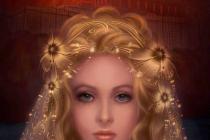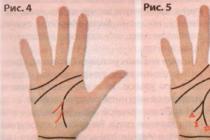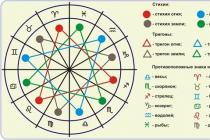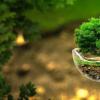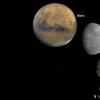If you are already well versed in natal astrology, you have learned your chart by heart and there is a desire to look into the future - this article is for you.
We have compiled the simplest way to predict the future for those who do it for the first time. We hope that this article will help remove fears and encourage you to study transit astrology deeper.
Everyone who works with transit, have their own rules, their own vision and their secrets. In this article, we offer help in the "first steps" when working with transit card, and leave the subtleties and tricks for later.
So, in the program in which you are working (in our example, it is ZET Geo), we build our natal chart and "put" on it a transit chart with tomorrow's date. It turns out a double chart, in which the inner circle is natal, the outer one is transit.
What to consider when analyzing transit
Example of a transit card
1) Let's take a closer look at each house of the natal chart, starting with the first, in order to understand which transit planets pass through our houses. Read about transiting planets in houses.

Transiting planets in the 1st house
In our example, it can be seen that the Moon and retrograde Pluto pass through the first natal house.
2) Consider the aspects of planets in transit to natal ones. In order to keep things simple, we will only pay attention to the connection, since this is the most important transit aspect. You can read about your aspects.
- We have a transiting retro Saturn conjunct the natal Sun in the 1st house. And the Sun is in trine to the transit Uranus, which passes through the 4th natal house.
- Transiting Moon conjunct natal Pluto in the 1st house.
- Transiting retro Pluto passes through 1 house without aspects.
3) Connections of transit planets with cusps of corner houses (cusp 1, 4, 7, 10 houses or Asc, Dsc, IC, MC) if any.

Because of this (events, situations, people, etc.)
Planet Saturn - Self-discipline, responsibility, order, father, limitations, authority, hard work, etc.
Will happen
Connection - a strong change, change (opposition - loss, refusal, choice; trine - luck, good opportunity; square - expenditure of energy, difficulty, tension; sextile - chance, opportunity.).
- an increase in responsibility, a subordinate position, trials, patience and work, pessimism, lack of confidence in one's abilities, or a person's desire to seem more authoritative, influential, etc.
What will happen and where? What is it? What will the change be about?
Planet Sun - my "I", life, my ambitions, individuality, etc.
Natal Sun in the 1st house. 1st house - "I", personality, physical body and appearance, independent decisions, independence, etc.
The sun rules Leo, a sign intercepted in the 8th house, so in this case we do not consider this house.

Sometimes cards can contain intercepted characters, i.e. the sign completely fits into the natal house and because of this does not appear on the cusp. Technically intercepted signs do not control the house.
Presumptive forecast
From the information we have collected, we can assume that: due to restrictions and lack of money (Saturn, 2nd house) for education, travel (9th house), etc., a global internal change (connection) occurs in a person. It is possible to change the appearance, life plans, self-esteem, etc. (Sun, 1st house).
What forecast would you make?
For the sake of simplicity of the example, we have left only one option. Of course, the options for the development of events may be different, since both houses and planets have a lot of designations. But since you will learn to work with your transits, you can always check and correct yourself.
Thus, try to describe each transit planet that makes an aspect to your natal chart. Make some simple things out of the information you collect forecast and write it down for future reference. We recommend that you keep a "transit diary" where you will write down your forecasts every day. If you find yourself wrong, it will be easy to understand why and where exactly.
The main thing is not to be afraid to make a mistake! Try it and you will definitely succeed.
In this post I would like to summarize the knowledge of reading transits. Maybe someone else will come in handy. (An example from my life).
Transit structure. Reason -> Effect.
The transit planet is the reason. It carries all natal information: position, control, aspects. The circumstances of the transit develop in the house through which the transit planet passes (in projection onto the natal).
The planet receiving the transit is a consequence. It is that which is modified under the influence of the cause. The position of the host planet in the house is the sphere of transformation, the place where events unfold. Acquiring new qualities during the transit period, the aspected planet transfers them to its possessions, i.e. to the house she runs.
Example: Transiting Pluto conjunct natal Uranus-Venus in the 9th house.
Natal Venus rules the 3rd and 4th house and stands at 9m in conjunction with natal Uranus, co-ruler of the 1st. Thus, the natal chart contains the formula for expanding, improving (9th house) living conditions (4th house) and moving (1-3-4-9).
Pluto in natal is responsible for changes, for expanding opportunities, for social assistance of the state (as the ruler of the 9th and 10th in the 8th), for the improvement of living conditions (as the dispositor of Uranus-Venus).
Pluto, transiting through the 9th conjunction with Uranus-Venus, includes the formula for moving and expanding living space.
That. Pluto is the cause - social assistance from the state.
Uranus-Venus - a consequence - moving and improving living conditions.
Two components of transit.
For ease of interpretation, you can decompose the transit into 2 components, and then synthesize the results obtained:
1
Psychological. Each of the planets participating in the transit has its own principle, its own psychology (taking into account the very principle of the planet and its position in the sign in the natal chart). The transit planet modifies the natal one, broadcasting its qualities to it at the time of transit.
2. Eventual. Possible events are predicted in accordance with active houses without the psychological coloration of the planets. Those. the principle of the planet itself is not taken into account, the emphasis is placed on a bunch of houses, from which the formula of possible events is formed.
Further, it is necessary to link one with the other, to determine possible events and their emotional coloring.
Let's take the same example with a move.Eventuallydescribed above. Psychologically sThe natal principles of Venus, Uranus in Scorpio and Pluto in scales are applied:Deep emotional changes and experiences, parting with the former circle of friends,new girlfriends, etc. Thus, the move was accompanied by a complex internal transformation, experiences associated with a change in the environment and environment. (The connection of the transit Lilith with Venus for some time aggravated the emotional state, but it was so long ago, I will definitely not reproduce it, I was 11 years old).
Transit aspects to the natal chart.
The conclusion about the nature of the transit aspect must be made in accordance with the natal chart. Those. see if there is a connection between the transit-active planets in the natal chart and the nature of this connection. If there is no such connection in natal, then the nature of the transit is determined by the transit aspect:
Trine, sextile - harmonious.
Square, opposition - tense.
The connection manifests itself in different ways - 50X50.
If in the natal chart there is a harmonious connection between the planets participating in the transit, then the intense transit creates temporary difficulties, large expenditures of energy, fatigue, but the result does not bear serious negative consequences. If there is a tense connection in natal, then the transit includes the problem, realizing it in events. It is worth noting that a person does not always perceive the tense aspects as a problem, for some people this pace of life is customary and they can achieve good results in the face of a stubborn struggle for a place in the sun. But as a rule, this is still a difficult time and the consequences are palpable.
In the above example, the conjunction of the transit Pluto gave outwardly positive events (a new spacious apartment), but an internally tense time of changes, a longing for the former environment. There is no major aspectual connection between the planets in the natal chart. There is only a dispositional connection and semi-sextile of Pluto and Uranus-Venus.
Repeated transit.
Suppose that in the transit chart (not in projection onto natal) the aspect of the planets is formed, which are interconnected in the natal chart, but the transit itself does not affect the natal planets. This means that some events will take place in the lives of other people and will not leave you indifferent, you can react to them very personally, although you yourself are not a direct participant in them.
Transit, being a completely new energy that a person encounters, is perceived to be so alien to the conscious mind that it is quickly projected into the outside world so that the conscious mind can safely consider it. From this safe observer position, the conscious mind can reduce its receptivity to this energy and, over time, internalize this alien type of energy brought in in transit.
The significance of transits depends on personal factors such as free will, attitude and approach to life, health, age and general outlook on life.
Interpretation of transits should be combined with other transit aspects operating at the same time, as well as natal, progressive and directional aspects. The actual aspect generated by the planet in transit is less important than understanding the characteristics of the planets in contact with each other and what this combination can promise and how to resolve it most constructively.
Any movement forward in the horoscope can bring you only what is already promised in the natal chart.
Transits are universal, i.e. the transit planet at any given moment of time will have a certain zodiacal position, and this position will be the same for everyone. If a planet changes its zodiac sign, the entire globe will experience the energy of that planet passing into a new sign. If the planet becomes direct or retrograde, this also happens at a universal level. That. zodiacal information about the sign of a transit planet, the direction of its movement and aspects to other transit planets is not of great importance for a given person, if the planet does not aspect his map.
Transits affect us not only on the external level. Our reactions to transits, progressions, or directions can be felt at any or all levels, because we should not forget that the ultimate criterion is always free will. If you want to be unhappy, you will be so regardless of what happens to you astrologically, psychologically, or physically. If you want to live a positive life, you will succeed no matter how many stumbling blocks you come across.
There are several aspects to every important event(these can be aspects of progressive, directional or transit planets), but not every aspect will indicate an important event.
Only slowly moving planets, starting with Jupiter, can warn us in advance about the activity in the horoscope; fast moving planets can narrow the timing down to a specific week or day.
Don't worry too much about the kind of aspects formed (conjunction, trine, quadrature, etc.); rather focus on the possible positive or negative use of the combination of the planets and the houses and signs involved.
When you work with transits, you will realize that so-called difficult aspects seem to be more effective than trines or sextiles. People tend to take all pleasant events for granted, but complain about every slightest difficulty.
Any event (transit) has three phases:
The beginning, the reason; at first you have the origins of the situation. Because of these events, other events described by the transit will occur.
The event itself: after you have a basic transit topic.
Consequences of the event: on the end you have consequences - what the event affected, the outcome of the event.
Transits to planets
Then:
Cause: the top row (the natal position of the planets involved in the transit) can usually be seen as the sphere of life where the event originates.
Action: the middle row (the house through which the transit planet moves) is the arena where the main event takes place.
Corollary: the bottom row (the houses of the natal chart, which are ruled by the planets involved in transit) are the spheres of life affected by the consequences of the transit, i.e. result.
Transits to the Corners: the passage of the transit planet through the Cross of Matter. When a transit junction is formed from any of these points, this energy is applied directly to that corner point, focusing on the problems of this house. All aspects of the corners, except for the connection, relate to the ASC and MC.
Table:
Sorting Transits
Frequency rule: The frequency of transit is inversely proportional to its effect.. The slower the planet moves in its orbit around the Sun, the more significant the effect it has when it forms a transit to the natal chart.
Rule of motion: The speed of a natal planet or point is directly proportional to its reaction to receiving transit. Transits to personal planets and the Cross of Matter have a more significant effect compared to transits to planets starting from Mars. The only exception is Saturn: any transit of Saturn to any of the points of the radix is very significant.
Aspecting rule: The smaller the harmonic (the number by which 360 is divided to get the aspect) of an aspect, the greater its influence in transits.
Strength of Aspects:
1. Union and opposition.
2. Quadrature and Trine.
H. Semi-square, one-and-a-half square and sextile.
4. Quickons.
Retrograde transit traffic
The transit is technically in orb from the moment of the first precise contact until the moment of the last precise contact with a specific degree and minute of the natal planet or point. Events that begin when a transit is formed will take up the entire transit period before reaching completion.
The number of transit interactions with the natal point has a certain value, since it represents the number of times (and / or the length of time) that fate considers necessary to learn a particular lesson that is decisive for personal development.
The first passage of the transit symbolizes observation: the fixation of what is not in our consciousness is observed for the first time, in order to then become a part of our conscious knowledge. Therefore, the first contact of the aspect can be the biggest shock.
The second phase symbolizes learning - awareness or recognition: recognition of the issue and our role in it, not yet accompanied by an understanding of what to do with it or how to manage it, but only recognition that it exists and is going to become a part of our life - this can be very difficult transit phase.
The third contact of transit is assimilation: an energy that was once so unfamiliar, alien and disturbing seems to merge with the background of other everyday memories, resources and experiences.
At the first contact of a particular transit, events occur that are beyond personal experience. At the second contact, the person does something that will allow him to include these events in his world. And the third contact is a period of assimilation, a time when the current problems of transit are no longer a problem, but merge with the background, successfully connecting with a person's life.
If the transit is long and consists of five contacts, then it is possible that the second stage of "learning" will take longer. This means that there will be difficulties in adapting to the new situation caused by the transit. If the transit is short - as in the case of some transits of Jupiter and Saturn, which can have only one contact lasting no more than a week - this is an indication that the person has already learned this information earlier. The real transit problems that need to be worked out will be very mild, with very few, if any, consequences.
Transit Orbs:
standard orb - 1 degree.
modification based on experience: orb - 12 arc minutes.
Traffic:
a) if the transit planet approaches the natal point, enters within 13 minutes of the arc from the natal point, but becomes retrograde before the aspect becomes accurate, the person does not begin to experience transit at this time... The transit planet must be within 12 arc minutes before its impact is felt.
b) when the transiting planet passes the natal point for the last time, even if it is still within 12 minutes of the arc, aspect completed.
Exceptions:
a) When during transit movement Saturn changes direction and begins to move to the natal point - and in this direct movement will reach the exact aspect to the natal point - then this is start of transit... If the transit is already in orb, then the periods of direction change are also culminating periods. Those. when Saturn becomes direct and is about to move forward a few degrees, bypassing the natal point, the transit will be in orbit from the day it became direct.
b) Uranus transits are accurate, and events usually occur on precision days.
Key Notes of Transit Impact:
Pluto brings to the surface and transforms, often completely ending the old form of life or expression.
Transiting Pluto moves so slowly that its significance does not differ much from that of progressive or directional planets, its aspects have been in orbit for almost three years. Pluto sows the seeds of change and transformation - but the actual germination of these seeds may occur later. Often when one of the fast moving transiting planets activates the sphere that Pluto previously touched. Pluto denotes strength, intensity, concentrated lasting energy, rebirth, transformation, the ability to start over and rebuild everything, the desire to do large-scale deeds and the energy of the masses; but it can also mean coups, obsession, brute force, dramatic change, and a criminal element.
Neptune undermines, dissolves, sensitizes, refines and spiritualizes. It can mean insight or illusion, idealism or seeing everything in a pink light, inspiration, imagination and creative thinking. It can represent your feelings of compassion, intuition, or perceptions so clouded that you can easily fall prey to fraudulent plans or become entangled in deception. It is the most elusive of all the planets, and the ability to use Neptunian principles positively or fall prey to them depends on your degree of self-awareness.
Uranus accelerates the rhythms of nature, hastening change; destroys, revolutionizes and brings to the realization that which was below the threshold of consciousness. Archetypally, it symbolizes unexpected changes, sudden infatuation, spiritual awakening, intellectual stimulation, intuition, originality, inspiration and divine dissatisfaction. When applied positively, its vibrations can symbolize heightened creative thinking, an increased understanding of metaphysical issues, a sublime enjoyment of the unusual, unexpected and sudden. To those seeking to maintain the status quo, the influence of Uranus can seem overwhelming. People with strong earth / water charts who are conservative and striving for reliability may be intimidated by sudden changes or impulsive actions. Air / fire signs seem to be attracted to variety. For those people who never count to ten and like to be arrogant in risky ventures, the influence of Uranus can be overwhelming. These people may act too impulsively, too hastily and recklessly, or simply behave in a completely extravagant way.
Saturn slows down the rhythm of nature, thus concentrating your experience; squeezes, puts a person in front of a realistic approach to life. The sphere through which the transit Saturn passes is well suited to lay new foundations and start positive construction in some direction. Negative use of the principles of Saturn can mean feelings of renunciation, limitation, and frustration. You may experience difficulties in your career, physical weakness, separation, too much responsibility and even grief.
Jupiter opens doors for new plans, aspirations and improvements; sets you up for future opportunities; encourages the diffusion into new areas of experience. Indicates spheres of expansion and expansion, including physical spheres (urge to overeat with resultant weight gain when transiting Jupiter aspects Asz or the Sun). In the archetype, it represents prosperity and success, patronage, cooperation, luck, gifts, growth, desire to learn, possible travel or travel to foreign countries, issues related to religion and law. Jupiter is considered a "beneficent" planet and has a wonderful reputation, but if you do not understand your natal Jupiter and have not worked with Jupiterian energy, transit alone cannot work wonders. The wonderful sense of lightness associated with Jupiter can just as quickly turn into self-indulgence or a tendency to overdo food, drink, drugs, entertainment, gambling, idle personality, and other "fun" things.
Mars breaks the usual rhythm of nature, imparting energy to it and prompting it to action; often makes a person impatient and temperamental. Gains great importance in all events related to the physical body. The energy of Mars is important for a sense of self-confidence, desire for achievement, a sense of the right timing, stamina, and sexual desires. Many astrologers do not take into account the transit Mars in their annual forecasts. Some pay attention to the houses he passes through, others mention certain aspects that need to be treated with caution. Since it mainly means difficult or tense aspects, it can create certain preconditions for the client, as if your prediction is causing the event to happen - or, becoming part of the client's consciousness, it can be carried out. This is one of the ethical problems that all astrologers face - to speak or not to speak. If you say a "possible" unfortunate event occurs, did you, as an astrologer, cause it to happen? If you don't speak and an unfortunate event occurs, could it have been avoided by alerting the client? There are no definite answers. You must follow your conscience: pay special attention to the client's position.
Venus harmonizes, smoothes the flow of experience and the expression of human energy. Sometimes it corresponds to good news or a feeling of release from tension. Can highlight pleasures, social affairs, your popularity, love relationships, material resources and values. When it moves retrograde, you may find it wise to postpone buying some very expensive and large items. This does not mean that something terrible will happen to you, but some minor troubles often surface that could have been avoided. When making an annual forecast, you don't have to worry about the transit of Venus, but you should check its movement if your client has a specific question related to a specific need or day.
Mercury rarely important, but sometimes matches communications and meetings that are meaningful. It deals with contacts, communications, correspondence, buying and selling, transportation and training. Most astrologers advise clients not to make new expensive purchases (car, house, etc.) and not sign contracts when the transit Mercury is in retrophase. It should be realized that thanks to free will, we can concentrate on preventing the loss of important papers and not allowing ourselves to lose mental peace. Mercury retrograde can be an excellent time to clean up remaining tasks, pay unpaid bills, complete unfinished business, and clear up confusing concepts. This is a good period for research, writing, and anything that requires deep thought. If a person has retro Mercury in the radix, he will do well during the transit retrophase, he will have clearer thinking. In the annual forecast, it is appropriate to indicate to clients the periods of Mercury retrograde so that they can accordingly build your plans .
Sun and moon must be taken together as a whole; the position of the new moon is most important because it excites everything that aspects. The full moon can also aspect natal planets. Since the Sun can represent your level of energy, will to live, chances of success or failure, your ego or any business related to bosses or authority figures, its transit aspects are especially important when considering favorable opportunities for work and career, if you have problems with health or when it comes to surgery. Once a year near your birthday, the Sun returns to its natal position and activates all natal aspects of the Sun. This is an excellent time to continue working on any unresolved natal issues and face difficult challenges that you previously avoided.
Key notes of planets activated by transits:
Pluto. Transits to natal Pluto involve the use of a person's inner strength and resources. Sometimes psychic experience is evident, in other cases various forced patterns of thinking and behavior are activated. Transits to Pluto are often not clear to those who have little awareness of their inner life. These transits sometimes mark the end of an entire chapter of life (especially if the transit planet is Saturn, Uranus, or Neptune), leaving only an empty shell and distant memories as a remnant.
Neptune. Transits to natal Neptune are especially important for spiritually oriented people. Since Neptune itself represents a state of extreme passivity, it must be activated by other planets (especially Saturn, Uranus, Pluto or the new moon) in order to manifest itself strongly and constructively. These transits will be a time of transformation or definition of a person's ideals, a collision with expansionism or an increase in psychic sensitivity. When Neptune is activated by Saturn or Pluto, a moderate crisis often occurs, because both of them encourage the integration of the ideals of the person or the cleansing of escapist tendencies and self-deception. Often during such transits, some circumstance makes us turn to face something that we would like to ignore. Often, but by no means always, there is a sexual problem (especially with transiting Pluto), since Western culture seems to specialize in self-deception, unrealistic ideals, hypocrisy in this area of experience. Western culture has no life myth or other way of understanding the connection between sexual energy and spiritual reality.
Uranus. The transits to natal Uranus affect how free a person feels, how he expresses his uniqueness and originality, and how he handles restlessness and desires for change and excitement. These transits also have an impact on any new ventures in which the person is involved. Man's concept of what really constitutes independence often undergoes an important change when Uranus is activated by transit Jupiter, Saturn, Neptune or Pluto.
Saturn. Transits to natal Saturn can affect the entire life structure of a person and all his long-term aspirations, but the emphasis usually falls on that area of life that is most associated with a sense of material security. Consequently, whatever constitutes a person's work, professional activity, or daily activities is most often the focus of these changes; and this includes the role of housekeeper and mother just as much as any role in the professional world. While the transit of Jupiter to Saturn often corresponds to an improvement or expansion of a person's professional situation, the transit of Uranus, Neptune, or Pluto is often perceived as a period of marked uncertainty and uncertainty about work and social status.
Jupiter. Transits to natal Jupiter mainly affect the future plans and aspirations of a person, whether it affects business or financial ventures, plans for education or travel, or the general direction of a person's efforts towards self-improvement through religious, philosophical or metaphysical activities. Transits of the four outer planets to Jupiter often have the effect of significantly changing a person's future plans and realizing his true potential.
Mars. Transits to natal Mars feel like changes in the way you claim your rights and the methods you use to achieve your goals. Increased clarity is usually evident about What would you like(except in the case of the Neptune transit), as well as a noticeable change in the flow of your physical and sexual energy. For men, this is often a startling change in their sense of strength and confidence in their masculinity; both sexes often have an increased sense of competence and the ability to defend their own desires.
Venus. Transits to natal Venus are experienced as changes in one or more areas: relationships and emotional activities, financial affairs, aesthetic tastes and personal values. These transits also directly correspond to how happy and contented a person feels in everyday life. For both sexes, there is often a marked change in their feelings of attractiveness and self-control; women often experience important changes in the development of their sexuality and confidence in their femininity.
Mercury. The importance of Mercury transits is often underestimated as they usually do not correspond to direct radical changes in circumstances or particularly painful crises. However, since transits to Mercury affect a person's way of thinking and expressing their perceptions, they should be given the same attention as any other important transits. Especially when Mercury is aspected by the five outer planets, there is a powerful influence on the way the conscious mind functions, in many cases leading, in the end, to a completely different position in relation to life (even if the changes may be subtle and not directly obvious to others) and / or involvement in a new skill or area of study.
The sun. Any transit to the natal Sun can be important, even the transits of Venus, Mercury and Mars, since everything that the Sun aspects directly reaches your immediate consciousness. These transits most often involve the way in which you try to express yourself in a confident and integrated way, while also influencing your creativity and sense of well-being. They are important in your overall attitude towards life and in your way of expressing all of yourself; they also have a direct impact on your physical vitality.
Moon. Transits to the natal Moon affect how a person feels about himself, how comfortable he is with himself and his current life situation, how he considers his connections with children, parents, family life or other areas related to his "roots". Factors of reliability and protection are predominant in the person's mind at this time, and he is often occupied with thoughts where he is “his” (ie, where the person feels truly comfortable). Women often develop a new awareness of their femininity and its implications for their future plans. Both men and women, however, at this time have the opportunity to increase their awareness of their lunar nature: soft, compliant and caring qualities.
If the planet is the ruler of Asz, the Sign of the Sun or Moon, the impact will almost always be greater than if this planet is relatively unrelated to important topics on the map.
Any connection with ASC or DSC one of the five higher planets in transit is usually important, often dramatic and with immediate and lasting consequences. These transits affect not only your approach to life in general and your confidence in who you are, but also your health and vitality.
23 May 2009When we establish what events can occur, it is necessary to determine the predisposition to any event (more than 1 marriage, death of a child, etc.) by the radix (i.e., birth chart). That is, first you need to determine what kind of events can be. Events that are not indicated in the radix cannot occur. Planets in houses, almutenes talk about life events. All this information must be written down and based on it, work with the radix.
Apart from these events, nothing can happen to a person. According to the radix, predispositions to events are determined, but not the form and time of events. For example, if there is no indication of marriage in the radix, but the current situation develops in such a way that there may be a marriage, then this will mean that the situation will be realized at a different level (a person will have a mistress, or the marriage will not take place). If a person is planning a social take-off, but there is no indication of this in the radix, then the person will not receive anything except a bonus or the 13th salary.
What should you focus on when determining the time of an event? To do this, it is necessary to take into account the transits of the planets, that is, their real movement from the time of our birth to the very death, that is, it is necessary to look at the ephemeris tables and compare the position of the planets today with the position of the planets in the radix.
After our birth, the planets do not stand still, they move along the Zodiac. They pass in transit through the houses of the radix, the places of the planets in the radix and through the points of the aspects of these planets, that is, they will constantly affect it, and we will constantly be influenced by the transits of these planets. Connections of transiting planets with radical daughters speak of the most important events in our life (when they pass through their radical places, or through the places of other planets).
Transits- This is the most difficult thing in astrology, because it is necessary to take into account a lot of factors.
First of all, it is necessary to determine: which planets are responsible for which events, that is, first it is necessary to determine the rulers of the houses. Situations associated with a given house are always favorable in cases where transit planets line up around this house. Let's say A2 (almuten of the second house) -. Therefore, an improvement in the financial situation will be only when the planets do not hit the transit Mars and there are favorable indicators in the second house or favorable. Favorable indicators are considered "friends" and "good" planets of the radix. Let's point out an important rule that helps to deal with transits.
Fast planets have an impact in the earlier years of life (Moon, Mercury, Venus). And in later years, they are complementary factors. The influence of distant planets increases closer to old age.
According to astrology, the transits of the slow planets are beyond the orbit of Saturn. Due to their speed, their transits are meaningful for entire generations. They indicate for a person the best direction in development on the basis of the collective unconscious, i.e. a whole generation of people born in a certain constellation of higher planets has a certain interaction between them and a certain balance of the higher cosmic forces.
How slow planet transits affect us
Therefore, the planets Uranus, Neptune and Pluto are sometimes called the bridge between the Earth and what is outside the solar system. You can find the definition that they are the messengers of the Galaxy and sometimes transmit to some people a part of the so-called energy of cosmic consciousness, not to everyone and not always.
Serious crises in human life can be associated with the transits of slow planets. Usually the solution to this crisis is solved in two ways.
Or, after the crisis passes, people strive to restore the "status quo", the state before the crisis is the least productive attitude to their own evolution.
Either they use the maximum energy of the crisis, a person goes to a new level in order to be able to balance his new state for subsequent evolutionary processes.
The crisis, which, as you understand, due to acquaintance with the transits of Jupiter and Saturn, and now Uranus, Neptune and Pluto, always takes place in life. This state is unpleasant, but it gives a person the ability to acquire maturity and balance at a new stage of development.
Higher planets can affect a person's character if one of the higher planets is the master of the horoscope or if this planet is the dominant of the map, or if it is in conjunction with one of the corner houses, or if it is in the corner house, or if this planet is heavily aspected.
A strong higher planet acts through the house, not through the sign. Since this planet has a common sign for a whole generation of people. A weak planet can only create a background.
What do the aspects and transits of slow planets mean?
For example, Uranus is a planet that opens the way to the wealth of the psyche of the collective unconscious, this planet does not manifest itself until 7 years. Because it is only in the first 7 years that it makes the first semi-sextile to its radix position.
If this planet is strong, then its manifestation will be noticeable, if not, then most likely, the first manifestation will be seen on the first growing square or even on the first opposition. The seven-year stay of Uranus in the sign can bring a radical transformation of the corresponding spheres of life.
Pluto has the first half-square, square and quintile, Neptune too. Both the one and the friend of the planet - Pluto and Neptune are especially sensitive through the passages through the corner houses. Neptune makes the first semi-sextile at the age of 14, and the presence of Pluto in the sign is from 13 to 31 years old, so here the regularity depends on the individual chart.
Such clear interactions, as in the transits of Jupiter and Saturn with the higher planets, are practically impossible to carry out. The movement of Neptune and Pluto due to their slowness is called the permanent integrating element of the personality.
The influence of the transits of slow planets is carried out during the period when one of them leaves the house of residence and enters the other. At this moment, it can significantly change the nature of human activity and his relationship with the world. On the transition from house to house, the significator changes with which the planet begins to interact.
Features of transits of slow planets
The transits of the planets Uranus, Neptune and Pluto, which are most distant from the Sun, make long-term transits that have far-reaching consequences. The influences of the transits of these planets are similar to those of the progressions.
Their effects are manifested both at the level of our subconsciousness and at the level of specific events. Often we perceive the aspects formed by these planets as fateful.
Pluto destroys in order to transform and recreate. Your attitude to the problems associated with the house in which this planet is in transit will radically change.
Uranus develops in us the desire to get off the leash and become free; we want everything to happen the way we want it. For example, when Uranus passes through the first house, you will become very self-sufficient, independent, willing to maintain your freedom.
When he is in the second house, your source of income may change dramatically or, in the most favorable aspects, you may suddenly become rich.
Transits of Neptune are rather associated with fuzziness, deception, disappointment or idealization. One of the clients had been married to an alcoholic throughout Neptune's passage through the seventh house.
When Neptune entered the eighth house, she said, “Why should I live with him? This is a bad marriage and I want to be free. " For many years she endured, but after the transition of Neptune to another sign, she had no illusions.
This is an extreme example. Under the influence of Neptune, everything is always seen in a light haze, or a person tends to self-deception.
When planets with large serial numbers - Uranus, Neptune and Pluto - cross the corners of the map, the Ascendant (first house), Nadir (fourth house), Descendant (seventh house) or Midheaven (tenth house), we begin new bright life cycles and we perceive life in a new way.

